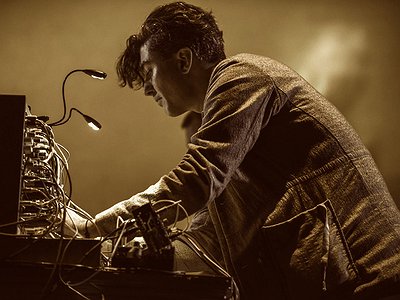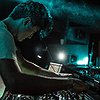Name: Kamran Sadeghi
Occupation: Sound Artist, Producer, Composer
Current Releases: Compound Eye on Brouqade
Recommendations: I am Sitting In A Room - Alvin Lucier / Music for 18 Musicians - Steve Reich / A People’s History of The United States - Howard Zinn / The Master and Margarita - Mikhail Bulgakov / Letting Air Through - Agnes Martin
Website / Contact: If you enjoyed this 15 Questions interview with Kamran Sadeghi, visit his personal website and facebook profile for current information.
When did you start writing/producing music - and what or who were your early passions and influences? What was it about music and/or sound that drew you to it?
I started music considerably late, I was about 17. I grew up a visual artist as a kid, painting and drawing. I was addicted to music and record shopping from an early age. I guess it all started with jazz, I wanted to be a jazz drummer.
For most artists, originality is first preceded by a phase of learning and, often, emulating others. What was this like for you? How would you describe your own development as an artist and the transition towards your own voice? What is the the relationship between copying, learning and your own creativity?
We are all a reflection of one another, and there is a link in the past to everything we do in the future, especially in music and art. I’m constantly learning by pushing the boundaries of my comfort zone and the threshold of my instruments. I think the artist is a vessel to interpret and transfer information without boundaries. If it’s done with true intentions, you are totally exposed and vulnerable. This is the hardest and most challenging part. Absolutely not the job for the narrow minded and faint-hearted.
What were your main compositional- and production-challenges in the beginning and how have they changed over time?
The main challenge was to realize (bring to life) what I was hearing in my head quick enough before it morphed or changed into something else. After so many years I’ve mostly overcome that challenge and now I can help to realize other peoples sonic ideas as well.
What was your first studio like? How and for what reasons has your set-up evolved over the years and what are currently some of the most important pieces of gear for you?
My first studio was a former squat conveniently located under a brewery! That was the first and last time I had a landlord that was excited to house a music studio. He gave me 3 months free rent to build it out, and with the help of a couple of friends I gutted the place, raised the floors and built a control room and live room. This is pre Ableton, so It was a really simple setup of protools HD, lots of acoustic instruments, synths, rack mount samplers and processors. From that point until now is a pretty extreme shift. First of all I’m traveling so much for various collaborations, live shows and recording sessions, that I’m mostly portable with my modular synths, elektron sampler, drum machines and the laptop. I’m of the opinion that you can do allot more with less during the creative process. My most important piece of gear are my ears and imagination.
How do you make use of technology? In terms of the feedback mechanism between technology and creativity, what do humans excel at, what do machines excel at?
For me it’s about pulling expressions and nuances from machines. Humans have always excelled at making a mess of things, but in the process we often reveal a deep emotional connection to what’s important. Machines are usually intended to make things easier, but in reality they do not, so I like to just push them into areas they were not designed to be in. I make machines work as hard as they make me work.
Production tools, from instruments to complex software environments, contribute to the compositional process. How does this manifest itself in your work? Can you describe the co-authorship between yourself and your tools?
The tools I use are complex, but I try really hard for this not to be heard in my work. I can make sounds fly around at breakneck speeds, snap back, jump out of the speakers and turn into a fire breathing dragon, but then we’re no longer telling a story about the music, we are focusing on the tool. It’s a fine line of pushing for new sonic dimensions by introducing more complex tools, and loosing the spirit and entrancing nature of sound and music.
Collaborations can take on many forms. What role do they play in your approach and what are your preferred ways of engaging with other creatives through, for example, file sharing, jamming or just talking about ideas?
I think collaborating can lead to so much individual growth if it’s done in a healthy way. I’m always reluctant to jam, or maybe it’s just the word that kind of turns me off. I like to work with people who have at least a basic foundation in place, a sound concept or even just a simple musical phrase. More than anything, there should be imagination, true intent and skill in all the people involved. Talking is also at very bottom of my list. It’s one thing to talk about an idea or what you want and it’s a whole other world to make that happen together.
Could you take us through a day in your life, from a possible morning routine through to your work? Do you have a fixed schedule? How do music and other aspects of your life feed back into each other - do you separate them or instead try to make them blend seamlessly?
Routine is crucial for me and keeps me from using inspiration as an excuse for not working. I’m not really a morning person, so I’m moving slow until I have my breakfast and strong coffee. Then I’m starting work around 11am taking care of admin stuff and all my collaborative work until about 7. After dinner I’m getting into the night shift. Evenings and late nights are less distracting and allow my imagination to wander. My social life is really limited because of this, and really only happens when I’m on tour or checking out a show. Music and the arts dominate my life, and have since a very young age. I’m the kind of person that needs to be fully absorbed in what I do.



